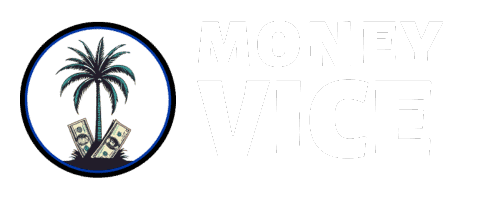
Disclosure: WE DON’T SELL ANY COURSES. We make money through product suggestions located in our content as an affiliate. We may earn a small commission at no extra cost to you. The ideas presented are Money Vice editorial team’s opinions and presented for entertainment purposes only. We’re not licensed financial advisors. The information presented should not be construed as financial or legal advice. Always do your own due diligence.
1. The Secret to Making a Biweekly Paycheck Stretch

👉 In a Nutshell: Make your paycheck last longer by planning how you’ll spend it before you even get it.
So, you get paid every two weeks, and by week two, your bank account is begging for mercy.
🫣 Been there.
The trick? You don’t just spend your paycheck. You stretch it. Think of your money like a giant pizza. If you eat half on day one, guess what? You’re starving by day five.
But if you slice it up evenly, you’re set for the full two weeks.
Your bills, your savings, your fun money. It all gets planned out ahead of time. No more “Wait, where did my money go?” moments.
↪️ Here’s How You’ll Do It
-
Step 1: Write It Down: Before payday, list every expense for the next two weeks.
-
Step 2: Divide & Conquer: Split your paycheck between must-pay bills, savings, and spending cash.
-
Step 3: Stick to the Plan: Only spend what’s allocated for each category. No stealing from future you.
2. The Best Way to Divide Your Paycheck for Maximum Savings

👉 In a Nutshell: Split your paycheck into set percentages so every dollar has a purpose.
If your paycheck was cash, would you dump it all in one pile and hope for the best?
Nah, you’d separate it. Rent, food, savings, fun money. That’s exactly what you need to do, just digitally 🤓
Try this: 50% needs, 30% wants, 20% savings. Rent, groceries, and bills? That’s your 50%. Streaming, takeout, and weekend plans? That’s your 30%. The last 20%? You don’t touch it. That’s your future safety net.
It’s like meal prepping, but for your wallet.
↪️ Here’s How You’ll Do It
-
Step 1: Set Up Auto-Transfers: Schedule 20% of your paycheck to go straight to savings.
-
Step 2: Use Separate Accounts: Have different accounts for bills, savings, and spending.
-
Step 3: Check Weekly: Look at your accounts and make sure you’re sticking to the plan.
3. The Simple Trick to Always Have Money Left Before Payday

👉 In a Nutshell: Give yourself a “fake” paycheck that’s slightly smaller than what you actually make.
Ever notice how when you have money, it disappears faster than an Uber Eats order? 🤧
Here’s a hack. Pretend you make less. Seriously. If your paycheck is $2,000, budget as if it’s $1,800. That “missing” $200? You put it in savings or an emergency fund.
By payday, instead of scraping for gas money, you’ve got a built-in buffer. No stress, no surprises.
↪️ Here’s How You’ll Do It
-
Step 1: Decide Your Fake Paycheck: Pick a number slightly lower than your actual income.
-
Step 2: Move the Difference: Transfer the “extra” money to savings immediately.
-
Step 3: Forget It Exists: Only touch it for emergencies, not impulse buys.
4. How to Stop Overspending When You Get Paid Every Two Weeks

👉 In a Nutshell: Trick your brain into spending less by splitting your paycheck into two weekly budgets.
You get paid, and suddenly, you’re feeling rich. New shoes? Why not. A random Amazon purchase? 🫠 Of course.
Fast forward a week. Broke.
The fix? Instead of thinking of your paycheck as two weeks’ worth of money, break it into two separate weekly budgets. If you only allow yourself to touch half in week one, you’ll have plenty left in week two.
Now you’re the one controlling your money, not the other way around.
↪️ Here’s How You’ll Do It
-
Step 1: Divide Your Paycheck: Only allow yourself to use half for the first week.
-
Step 2: Track Your Spending: Use a budgeting app or a simple note on your phone.
-
Step 3: Wait Before Buying: If it’s not a necessity, wait 24 hours before making a purchase.
5. How to Handle Bills When You Get Paid Every Two Weeks

👉 In a Nutshell: Line up your bill due dates with your pay schedule to avoid financial panic.
Ever had a bill hit when your bank account is on life support? Not fun 😭
Most people don’t realize it. You can call companies and ask them to change your due dates. Align your bills with your paycheck schedule, and you’ll never be caught off guard.
It’s like rearranging your calendar so everything fits perfectly. No surprises, no stress.
↪️ Here’s How You’ll Do It
-
Step 1: List Your Bills: Write down every bill and its due date.
-
Step 2: Call to Adjust Dates: Ask your provider to move the due date closer to payday.
-
Step 3: Set Up Auto-Pay: So you never forget (and avoid those annoying late fees).
Money isn’t about how much you make.
It’s about how well you manage it.
Start small, stay consistent, and watch your finances transform.
“Do not save what is left after spending, but spend what is left after saving.” – Warren Buffett
✌️ Dale! (See you!)










